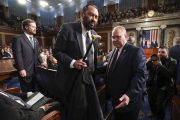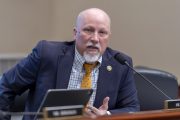
House Majority Leader Steny H. Hoyer (D-Md.) stated on December 11 that the federal government must borrow at least $1.8 trillion more in 2010 if the United States is to avoid defaulting on its debts. This would be over and above the current $12.1 trillion national debt limit.
Democrats are trying to stick together to pass a bill that would raise the federal debt ceiling to $14 trillion. By doing this now, they hope to avoid dealing with the issue closer to next year’s midterm elections.
Yet the politically unpopular move of putting the nation deeper into debt is being resisted by more than 50 moderate “Blue Dog” Democrats. They are vowing to withhold their votes unless a “pay-as-you-go” law is included in the debt-increase legislation.
A pay-as-you-go law aims to ensure that tax cuts or spending programs don’t add to the deficit (as opposed to eliminating or even reducing projected deficits). It would require that any new spending would be offset by either cutting other spending or increasing revenue (i.e., tax hikes), and it would enact across-the-board spending cuts if Congress fails to abide by the law.
Also causing disunity within the Democratic Party are about a dozen Senate Democrats who say they won’t vote for an increase in the federal debt unless a commission of lawmakers and administration officials is set up to address deficit reduction. House Speaker Nancy Pelosi (D-Calif.) and other top Democrats such as Finance Committee Chairman Max Baucus (D-Mont.) oppose this move.
Hoyer has pledged to attach a strict “pay-as-go” budget law to any legislation that increases the debt limit. He said that negotiations are under way to deal with the concerns regarding pay-as-you-go and the federal deficit.
Almost 50 Republicans in the House are also making their own attempt to thwart an increase in the national debt. Congress has already raised the limit seven times since 2002, so they have co-sponsored a bill that would make it more difficult for Congress to raise the debt ceiling. However, it is unlikely that such legislation could pass in time to do any good for the current debate.
"We need to restore fiscal responsibility in Washington and put an end to this out-of-control spending and massive debt that’s being dumped onto our children and grandchildren," Representative Steve Scalise (R-La.) said in a written statement. Scalise and Representative Kevin Brady (R-Texas) introduced legislation on December 11 that would require a two-thirds majority vote in both the House and Senate to raise the national debt ceiling. The bill would also prevent legislators from attaching such a measure to any other budget bill.
But Scalise’s spokesman, Luke Bolar, noted that this will probably be too little too late to stop the Democrats from increasing the limit this year. He said the legislation will likely only be able to make any future attempts more difficult.
"The whole legislative process would not happen in time for this round of appropriations," Bolar declared. "Ideally you could get it through and pass it as fast as possible."
It is probable that the Democrats will attach their increased borrowing measure to the Defense spending bill. Scalise has called on Pelosi to let the defense bill stand alone, saying that linking the debt-ceiling increase to troop funding is shameless.
House Minority Leader John Boehner (R-Ohio) said of the Democrats: "They have made a habit of taking defense appropriation bills, bills that fund the support of our troops, and adding on there the most distasteful things they can think of, trying to make sure they get it passed on the backs of our soldiers. It’s a bad way of doing business."
Running the national government on a deficit is akin to living on credit cards; the interest will eventually exceed the borrower’s ability to repay. Senator Judd Gregg (R-N.H.) said on December 10 that the U.S. government is broke and should be focusing on its need for fiscal responsibility.
Gregg said this "is not a theoretical problem — it is directly in front of us." He issued the dire warning that "the nation will go bankrupt" if spending is not brought under control.




